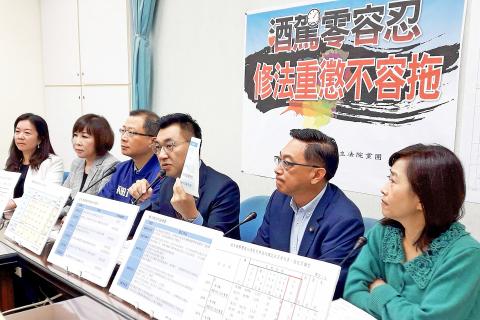The Chinese Nationalist Party (KMT) caucus yesterday urged the Executive Yuan to step up efforts to tighten rules against driving under the influence (DUI) of alcohol or narcotics.
In the wake of a recent spate of deaths resulting from drunk driving incidents, lawmakers across party lines have submitted more than 20 draft amendments in a bid to strengthen penalties for DUI.
However, aside from Premier Su Tseng-chang (蘇貞昌) expressing his “rage” on Facebook, the Cabinet has yet to propose any amendments, which raises the question of whether it is serious about tackling the problem, KMT caucus whip Johnny Chiang (江啟臣) told a news conference at the Legislative Yuan in Taipei.

Photo: CNA
In 2013, lawmakers raised the maximum prison term for a DUI incident that resulted in a death to 10 years, which has helped reduce the number of drunk driving cases, he said.
However, from 2014 to last year the number of repeated offenses increased by one-third, he added.
The caucus has scheduled a public hearing on its proposed amendments for Tuesday next week, urging the Ministry of Justice to swiftly put forward its draft amendments, he said.
Statistics have shown that raising penalties can deter drunk driving, but the most recent amendments have had a limited effect, KMT caucus secretary-general John Wu (吳志揚) said.
The ministry has opposed proposals by lawmakers to stiffen penalties for drunk drivers, saying such efforts would be “disproportionate,” but over the years, society has arrived at a consensus of zero tolerance for fatalities caused by drunk driving, Wu said, urging the ministry to heed public opinion and not to obstruct the KMT’s proposals.
A draft amendment to the Criminal Code sponsored by Chiang and 19 others seeks to raise the penalty for DUI from a maximum jail term of two years and a maximum fine of NT$200,000, to seven years and a maximum fine of NT$500,000.
The proposed amendment would also stipulate the death penalty, life imprisonment or a maximum prison term of 12 years for fatal drunk driving offenses.
Meanwhile, a proposal by Wu and 16 others seeks to impose the death penalty or life imprisonment on repeat DUI offenders.
KMT legislators Huang Chao-shun (黃昭順) and Shen Chih-huei (沈智慧) have also proposed amendments to the Criminal Code recommending the death penalty or life imprisonment for causing fatalities as a result of driving under influence of alcohol or drugs.
Another proposal by Wu to amend the Road Traffic Management and Penalty Act (道路交通管理處罰條例) would impose a fine of between NT$90,000 and NT$180,000 on people driving under the influence of alcohol or narcotics who refuse to comply with police request for an inspection and drive off.
A proposal by KMT Legislator William Tseng (曾銘宗) to amend the act recommends a fine of NT$150,000 for people who knowingly ride with a drunk driver.
Tseng’s proposal also seeks to have repeat offenders install alcohol sensors and automatic carburetor locks in their vehicles, and to allocate a proportion of fines collected to fund efforts to combat alcoholism.

Taiwanese can file complaints with the Tourism Administration to report travel agencies if their activities caused termination of a person’s citizenship, Mainland Affairs Council Minister Chiu Chui-cheng (邱垂正) said yesterday, after a podcaster highlighted a case in which a person’s citizenship was canceled for receiving a single-use Chinese passport to enter Russia. The council is aware of incidents in which people who signed up through Chinese travel agencies for tours of Russia were told they could obtain Russian visas and fast-track border clearance, Chiu told reporters on the sidelines of an event in Taipei. However, the travel agencies actually applied

Japanese footwear brand Onitsuka Tiger today issued a public apology and said it has suspended an employee amid allegations that the staff member discriminated against a Vietnamese customer at its Taipei 101 store. Posting on the social media platform Threads yesterday, a user said that an employee at the store said that “those shoes are very expensive” when her friend, who is a migrant worker from Vietnam, asked for assistance. The employee then ignored her until she asked again, to which she replied: "We don't have a size 37." The post had amassed nearly 26,000 likes and 916 comments as of this

New measures aimed at making Taiwan more attractive to foreign professionals came into effect this month, the National Development Council said yesterday. Among the changes, international students at Taiwanese universities would be able to work in Taiwan without a work permit in the two years after they graduate, explainer materials provided by the council said. In addition, foreign nationals who graduated from one of the world’s top 200 universities within the past five years can also apply for a two-year open work permit. Previously, those graduates would have needed to apply for a work permit using point-based criteria or have a Taiwanese company

The Shilin District Prosecutors’ Office yesterday indicted two Taiwanese and issued a wanted notice for Pete Liu (劉作虎), founder of Shenzhen-based smartphone manufacturer OnePlus Technology Co (萬普拉斯科技), for allegedly contravening the Act Governing Relations Between the People of the Taiwan Area and the Mainland Area (臺灣地區與大陸地區人民關係條例) by poaching 70 engineers in Taiwan. Liu allegedly traveled to Taiwan at the end of 2014 and met with a Taiwanese man surnamed Lin (林) to discuss establishing a mobile software research and development (R&D) team in Taiwan, prosecutors said. Without approval from the government, Lin, following Liu’s instructions, recruited more than 70 software